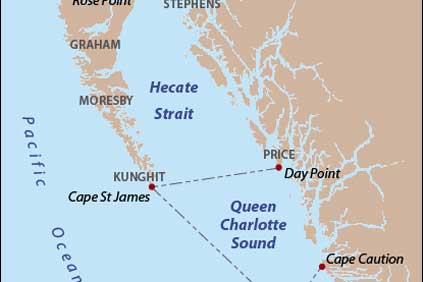The approval comes after more than six years of extensive analysis and community consultation by NaiKun Wind Energy Group, a developer based in Vancouver, BC.
The project is located in the Hecate Strait between the BC mainland and Haida Gwaii, an island archipelago formerly known as the Queen Charlotte Islands.
It underwent what NaiKun vice-president Matt Burns calls a rigorous and transparent process that included input from provincial and federal agencies, First Nations and the public.
BC's environmental assessment office ruled the project is not likely to have significant adverse effects and would help meet the province's goal of decreasing reliance on imported electricity while reducing greenhouse gas emissions.
But it also laid out 100 conditions the company must meet through various stages of the project, including undertaking a joint research project with the local crab fishery to monitor crab movement in the area and implementing an adaptive management plan for marine birds.
NaiKun still needs federal environmental approval for the project to proceed, as well as a contract for the power it will produce. The project, expected to cost C$2 billion (US$1.9 billion), is one of 47 projects still in the running in BC Hydro's call for new renewable energy supply.
It would see the installation of 110 Siemens 3.6MW turbines connected to BC Hydro's power grid at Prince Rupert, a city on the northern mainland, via 95 kilometres of undersea cable.
An additional link will be built from the project to Haida Gwaii, effectively connecting the islands to the provincial grid. Haida Gwaii currently gets most of its electricity from diesel generators.

.png)

.png)











